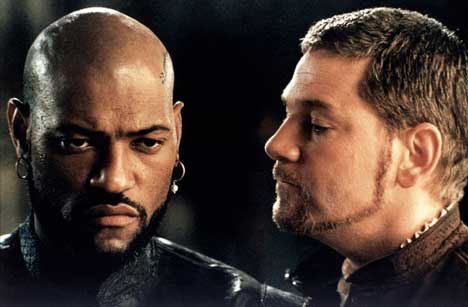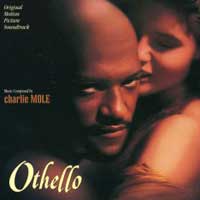Oliver Parker‘s version of Shakespeare’s play, Othello, is best described as a sexual thriller saturated in treachery.

The 1995 film, although using Shakespeare’s language, selects only the script from the original that connects with a sexually aware setting. Much of the poetry of the original is lost for the sake of flow and continuity.
Screenplay was written by Parker, who had previously played Iago and Roderigo himself in theatrical versions of Othello. Othello (1995) was filmed on location primarily at a 15th century castle near Rome.
Othello, played by American actor Laurence Fishburne, provides a powerful presence in this film, more so than the stereotyped version envisaged by Shakespeare.
French/Swiss actress Irène Jacob, as Desdemona, brings a sense of exotic sensuality to her role but struggles to win the heart of the audience.
With only two hours (compared to four hours in the play) to play out his role, Kenneth Branagh, as Iago, is clearly treacherous and murderous from the beginning.
Oliver Parker takes Shakespeare’s black and white symbolism and explores them carefully in contrasting treatments of night time scenes in Venice and daytime scenes in Cyprus.
Other Characters/Actors
Cassio: Nathaniel Parker, (Oliver’s brother)
Roderigo: Michael Maloney
Emilia: Anna Patrick
Montano: Nicholas Farrell
Bianca: Indra Ové
Lodovico: Michael Sheen
Gratiano: Andre Oumansky
1st Senator: Philip Locke
2nd Senator: John Savident
Duke of Venice: Gabrielle Ferzetti
Brabantio: Pierre Vaneck
 Othello was produced by David Barron and Luc Roeg. Cinematographer was David Johnson.
Othello was produced by David Barron and Luc Roeg. Cinematographer was David Johnson.
Original music was scored by Charlie Mole.
See Alan A. Stone’s review of Oliver Parker’s sexual thriller in Boston Review.
See Patricia Dorval’s notes on threshold aesthetics in Oliver Parker’s Othello, including quicktime and RealMedia excerpts.
See Teachers Notes (21-page pdf) designed for GCSE Media Studies in the UK.
See Royal Shakespeare Company’s teachers notes on film treatments of Othello.

the movie is very nice and it helped me to understand the play much beter but what i want to know is that why is the ending of the movie so different from the ending of the origional play and the death of Desdemona is also different. this cauesd the strong argument between me and my class mates.
how come i dont get the respond from the spark notes because it has been a week since i posted my comment
the book othello was good an so was the movies i enjoy the movies more
I have learn some good stuff here. Certainly value bookmarking for revisiting. I surprise how so much attempt you put to make this sort of excellent informative website.
One interpolation in the film was particularly interesting: in the scene at the end of the play (& film), after Desdemona’s murder has been revealed to everyone, Cassio slips Othello a dagger, and they exchange looks clearly intended to imply that both know that Othello has no choice but to kill himself. This gives added weight to Iago’s final comment, “What you know, you know,” which in this context can be read as suggesting directly to Othello that his susceptibility to Iago’s deceptions has revealed substantial flaws in Othello’s character, making it impossible for Othello to continue to live honourably. He and Cassio, as military men, know that death is the only option, and, nobly, Othello kills himself. In the play, Othello’s suicide is by a dagger that he had himself concealed, and Cassio is a relatively passive onlooker. This alteration to the play’s ending is substantial, and gives the filmgoer unfamiliar with the play a quite different take on Othello’s death.
Another substantial interpretation manifest in the film is a suggestion (or so it seemed to me) that there is something almost unseemly in Othello’s and Desdemona’s public displays of affection, particularly in the scene showing their reunion on Cyprus. The onlookers are depicted watching on with a mixture of embarrassment and slight nausea, with a hint of distaste at the inter-racial nature of the pairing. Again, this seemed to me to be a significant variation to the play (at least as read relatively straightly).